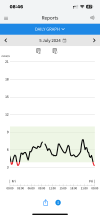Hi all, I'm on day 8 into the NHS momentum very low calorie diet (800kcals a day).
As part of the program you have to monitor your blood glucose and they provide a finger pick device.
I was given a free trial of a Libre2 which I've used for 2 days.
The diet is going well (13lbs down) but I'm a bit worried about reading the reports from the libre2.
It shows a couple of times during the night my MMOL is going down to 3 for short periods before bouncing back to 4-5.
Can anyone suggest why it is doing this?
My plan tonight is to set an alarm if it goes to 3 then finger pick test myself incase the Libre2 isn't being accurate.
Any other suggestions/advice?
As part of the program you have to monitor your blood glucose and they provide a finger pick device.
I was given a free trial of a Libre2 which I've used for 2 days.
The diet is going well (13lbs down) but I'm a bit worried about reading the reports from the libre2.
It shows a couple of times during the night my MMOL is going down to 3 for short periods before bouncing back to 4-5.
Can anyone suggest why it is doing this?
My plan tonight is to set an alarm if it goes to 3 then finger pick test myself incase the Libre2 isn't being accurate.
Any other suggestions/advice?


